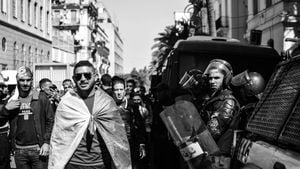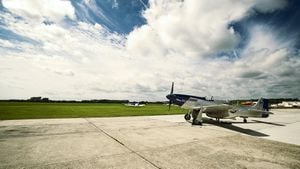Former Hong Kong media mogul Jimmy Lai, currently embroiled in a highly publicized national security trial, firmly denied accusations on Wednesday. He stated he did not solicit then-U.S. Vice President Mike Pence or former Secretary of State Mike Pompeo to intervene against Beijing during the city’s anti-government protests back in 2019. The trial, taking place at West Kowloon Magistrates' Courts, is seen as pivotal not just for Lai but for the broader issues of media freedom and judicial independence within Hong Kong.
Lai, the founder of the now-defunct pro-democracy newspaper Apple Daily, was arrested amid the crackdown on dissent following the protests. He faces serious charges, including colluding with foreign forces under the controversial national security law imposed by Beijing, with possible life imprisonment hanging over his head if convicted.
During his testimony, Lai elaborated on his interactions with several Western politicians, including prominent figures from the United States, Britain, and Taiwan, such as former Taiwanese President Tsai Ing-wen and Chris Patten, the last governor of Hong Kong under British rule. Lai emphasized he never attempted to shape foreign policy concerning Hong Kong or initiate any actions against Beijing through these meetings.
Specifically addressing his meeting with Pence during a trip to Washington, D.C., Lai indicated he only encouraged the U.S. to express verbal support for Hong Kong’s autonomy—something he termed as, “not to do something but to say something.” This distinction drew attention, highlighting Lai's assertion against the allegations leveled by prosecutors, who suggested he sought international intervention.
Prosecutors detailed meetings from July 2019, claiming Lai had endeavored to lobby for U.S. sanctions against mainland Chinese officials taking harsh measures against activists during the demonstrations, which were ignited by a controversial extradition bill proposal. Lai refuted these assertions, establishing his narrative about his motivations and the objectives he sought to achieve through his political engagements.
The backdrop of this trial is mired with tension and societal upheaval. Lai’s case is emblematic—serving as a litmus test for the current state of freedoms enjoyed by the residents of Hong Kong, especially concerning press liberties. Crowds gathered outside the courthouse, with many attendees expressing solidarity and support for Lai, including members of the Catholic clergy and former readers of Apple Daily. One supporter, identifying himself as William Wong, remarked, “I wanted to remind Jimmy Lai and the world we haven’t forgotten him.”
This courtroom scene is set against the grim realities of Hong Kong’s political atmosphere post-2019, where many pro-democracy activists have faced stringent crackdowns under the national security law, which Beijing implemented after the protests. That legislation has been leveraged to silence opponents and curb dissenting opinions, leading to the imprisonment of several leaders of the democracy movement. Just recently, 45 democracy advocates received prison sentences ranging from four to ten years—a reflection of the state’s hardening stance against activism.
Lai expressed his frustration with the deterioration of civil liberties, positing in his testimony, “It’s beyond me” when asked if he sought actions from the U.S. government, reiteratively stating the importance of communication and support rather than interventionist actions. He departed from more hyperbolic notions of independence, labeling them as “crazy.” This was part of his broader narrative, emphasizing the primacy of education and knowledge as tools for liberation: “The more you know, the more you are free.”
Despite the grim outlook, international observers have been vocal about the pressing need for Lai’s release. The U.S. and U.K. governments, alongside independent human rights organizations, continue to call for his freedom, spotlighting what they see as politically motivated charges aimed at quelling dissent.
After detailing his connections with past U.S. officials and the former Taiwanese president, Lai distanced himself from any communications with Donald Trump, emphasizing he simply endeavored to assist Taiwan amid its challenges with mainland China. Lai sought to present himself as someone who navigated the geopolitical arena to advocate for democratic ideals without external influence.
Before remarks from the more prominent political figures, the courtroom was somewhat reflective of society’s polarized views surrounding Lai’s actions and the broader pro-democracy movement. The Hong Kong government, meanwhile, continues to assert its measures have stabilized the region post-2019 unrest. Security Secretary Chris Tang defended the law's credibility and validity, countering claims of biased enforcement.
Reflecting on his treatment, Lai's son highlighted the adverse conditions his father has faced, describing the elderly 77-year-old as enduring “inhumane” treatment during his nearly four years of solitary confinement. His son, Sebastien Lai, voiced concerns over the health impact such conditions might have on his father, reiteratively calling attention to the experimental nature of confinement.
The trial is expected to continue, with more courtroom drama and political intrigue anticipated as Lai narrates his experiences, and several luminaries continue to advocate for his cause. Amid rain drenching supporters outside the courtroom, this trial remains not just about Jimmy Lai, but also symbolizes the fight for freedoms many see under siege within the former British territory.
With each passing day, global attention remains fixated on the courtroom, reflecting international sentiments as figures like former President Trump have promised to address Lai’s situation should circumstances permit. Trump stated unequivocally, “100%, I will get him out,” should he resume leadership, aiming yet another spotlight on the enduring campaign for accountability from Beijing.
The meetings between world leaders and Hong Kong activists signal not just persistent defiance but foretell the complex interplay between sovereignty, self-governance, and international diplomacy. Meanwhile, the Hong Kong leadership remains firm, insisting local affairs should be fiercely protected from foreign interference, maintaining their narrative about the investigations and prosecutions being rooted firmly within local law and independent judicial procedures.
Indeed, as Lai awaits the next chapter of his trial, what is at stake reverberates far beyond the bounds of any single courtroom; it touches upon fundamental liberties, the right to free speech, and the essence of democracy not only in Hong Kong but across the globe.



